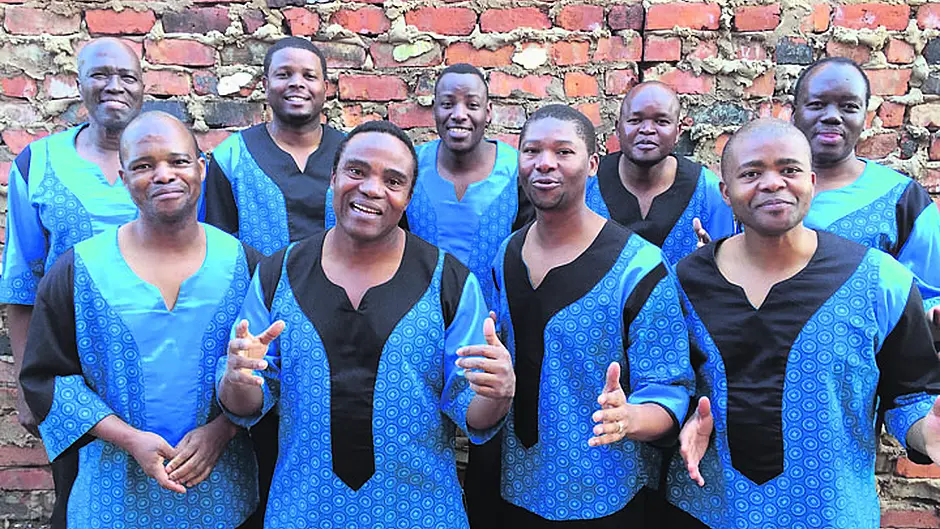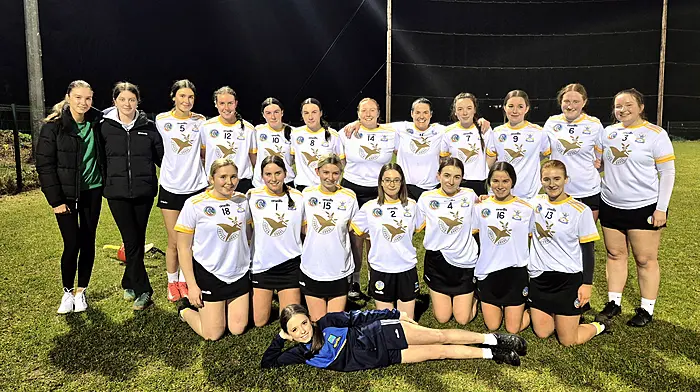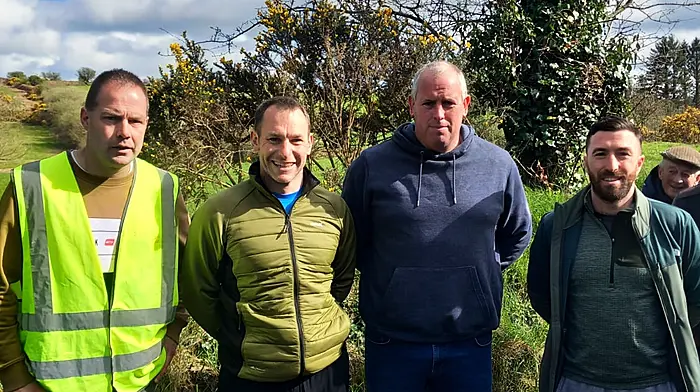The world-renowned South African a cappella choir Ladysmith Black Mambazo will perform on Friday, August 4th for Skibbereen Arts Festival.
The world-renowned South African a cappella choir Ladysmith Black Mambazo will perform on Friday, August 4th for Skibbereen Arts Festival. Long-time member Albert Mazibuko tells Niall O'Driscoll what the West Cork audience can expect
‘SAWUBONA' is the Zulu word for ‘hello' – just how Albert Mazibuko greeted me when we spoke recently. He has been a member of  Ladysmith Black Mambazo since 1969 but it wasn't until they featured on Paul Simon's Graceland album in 1986 that they really came to world attention.
‘Ladysmith Black Mambazo was formed by Joseph Shabalala during the 1960s,' Albert explained. ‘Joseph was born in the town of   Ladysmith but moved away to Durban, which is the second largest city in South Africa, when he was 18 years old. There he began recruiting people to sing in his group. He had a certain sound he wanted the group to have, so it took him several years before he felt it was correct. I joined the group in 1969.Â
‘Joseph retired in 2013 and has four sons now leading Ladysmith Black Mambazo. His sons joined almost 25 years ago, so they have been a very important element to our singing for many years. From the early days, there is still me and my younger brother, who joined in 1974. One of our other early members retired two years ago and his son replaced him. So even though the membership has changed over the past 50 years, the group stays very stable and family-oriented.
‘It has been an amazing journey,' he says. ‘My life became a dream I never dared dream as a young black South African living in apartheid South Africa. I still pinch myself about all that I have experienced and the many places I've been, the people I've met.'
Becoming a member of Ladysmith Black Mambazo is an intricate process. ‘As you might imagine, so many people would love to join our group but this just cannot happen. What we have done is to allow people to sing with us in rehearsals so they can learn to sing and perhaps form their own group. If not forming another group, just to sing with us as a hobby, something that brings them joy. Many of our children do this for years and years. This is actually how we train possible future members,' he explains. ‘It not only helps them become better singers, but gives them a dedication to what we are doing. When we do need a new member, that person must understand what it means to be a member of Ladysmith Black Mambazo. It means rehearsing 5-6 days a week, every week, without receiving a salary for those days. It means being away from their homes, their families, children, for weeks and months at a time. It takes years for us to see within someone what is necessary to become a member of our group.
Since Joseph's sons joined in 1993, we have had only three new members. Thankfully those members were developed through our rehearsal process and have stayed with us. They are our future. They are the people who will carry our mission on for decades to come.
Albert says the Ladysmith Black Mambazo style of singing, which is called ‘iscathamiya' (is-cot-a-me-ya), has been an important part of South African culture for over 100 years. ‘Obviously, with no instruments needed other than the voice, it was a way to entertain yourself and others anytime. It was a big part of self-entertaining for men who left their homes to work in the mines. They would be away from home for months and months and on Saturday night, with the next day off, they would stay up late and sing all night and into the morning.'
When he was young and living on the family farm outside of the town of Ladysmith, it was a way for the family to be close to each other. ‘We lived within close proximity to our cousins, uncles, aunts and other extended family. We would gather together often to sing with each other,' he recalls. ‘As I grew older and sang with Joseph, I saw how singing for people, during apartheid, was able to bring hope to people. Millions of our fellow citizens were in great despair and they needed hope to get through each day. We did what we could to provide this hope. We did this for many years and when Nelson Mandela was freed from prison after 27 years, he told us that our songs were one of the most important things to help him stay strong while he was in prison. That was a powerful moment for us,' he says.
Joseph Shabalala wrote all the songs for the group back then. ‘He wanted his songs to be about hope, about overcoming struggles and obstacles. He also wrote songs about our people's history and culture. He wanted people to know who they were and to be proud of themselves. We did not want people to feel they were not worthy of the best that life should offer. Apartheid was meant to destroy the black population, to break people down and make them feel helpless, easier to control. Our songs were meant to inspire,' says Albert. ‘This was and continues to be our mission, not only for South African people but people everywhere around the world. Our struggle was not limited to our borders. It is a struggle continuously going on all over the world. Our mission has been to bring hope to people everywhere. We want to continue this mission for many many years to come. Since Joseph retired, his sons have been writing more and more of our songs. They continue his tradition.'
When Graceland happened and the group travelled with Paul Simon (1987-1989) they saw how powerful their message was. ‘We had no idea our singing could affect people outside of South Africa but this is what Graceland showed us. This is when we saw people struggling everywhere and that people would still connect to what we were doing, whether they were from Ladysmith, South Africa or Ladysmith, Virginia, USA … or even Skibbereen!'
Ireland is a long way from South Africa, both culturally and geographically, yet there is a huge affinity for their music here too.
‘I think it's because we are authentic and traditional. Music is ever-changing, ever-modernising. Yet, many people seek music that represents the past, music that has something to say about a people, a country and a time in history. Woody Guthrie, The Chieftains, Ladysmith Black Mambazo are all examples of this.
Ireland is one of the group's favourite places to perform. ‘It reminds me so much of South Africa because the people of Ireland love their land, they love their history and they love their traditions,' says Albert. ‘They don't forget their past, be it culturally or historically. This is how it is in South Africa.'
Many people may think Skibbereen is an unlikely venue for such a globally recognized group. Albert agrees. ‘Every so often we get to experience a little-known place, off in the distance, that people don't know much about. These are the places we love so much. Yes, we play London, New York, Los Angeles and other big big cities very often. Of course there is something special about being embraced by those large places. However, when we can come to an ‘off the beaten path' place such as Skibbereen, this is where lifelong memories are made. It will be a great joy to share our songs with the people attending the Arts Festival. We hope they enjoy our songs. Thank you, or as we say in Zulu, Ngiyabonga!'
• Ladysmith Black Mambazo will perform in Abbeystrewry Church in Skibbereen on Friday, August 4th at 8pm.
Also performing will be award-winning Irish traditional singer Nell Nà ChróinÃn.Â
For more go to: skibbereenartsfestival.com








